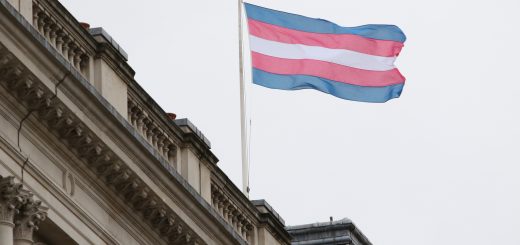The debate surrounding Alberta’s proposed transgender youth policies

Bella Coco, Staff Writer |
On Jan. 31, Alberta Premier Danielle Smith announced numerous proposed policies affecting transgender youth. According to Smith, the legislation will be introduced this fall. These policies include a ban on hormone blockers and treatments for those under 16, and have sparked a wildfire of debate across the province.
Smith has said that the choice to go on hormone blockers and treatments as well as decisions to be made regarding a child’s pronouns are decisions best made by adults and parents.
“I am also confident that parents love their kids and they want to know what’s going on with their kids. Doesn’t matter what perspective they come from, they want to make sure that they’re walking the journey with their child every step of the way, and anyone who’s trying to put roadblocks in that child-parent relationship, I don’t think they have public support,” Smith said in a news conference on Feb 1.
The policies
Smith continued to say that the province understands that there may be difficult conversations ahead and that the province will provide counseling for families and child protection services for those who feel at risk or in harm’s way.
Additionally, Smith said that the science surrounding the safety of hormone treatments and blockers has not been settled during the news conference.
While other provinces in Canada, such as New Brunswick and Saskatchewan, have also introduced related policies in the last year, Alberta’s policies go much further. Some of the policies include measures of: (1)Children under the age of 15 will not be permitted to go under any hormone treatments or puberty blockers.(2)If a child under the age of 15 wishes to change their pronouns or name at school, parental consent is required. For students aged 16 or older, the school is required to notify the parents, but no consent is needed. (3)Top surgeries and bottom surgeries will be banned for those 17 and under. (4)Youths aged 16 and 17 will only be permitted to undergo any hormone treatments or puberty blockers if they are “deemed mature enough” with psychologist, parental, and physician approval.
Smith has stated that the government is keeping trans children’s best interests in mind, but not everyone agrees.
The queer perspective
According to Celeste Pang, assistant professor of Women and Gender Studies at Mount Royal University (MRU), Smith’s new policies directly impacts the safety of trans and queer youth.
“The proposed policy changes target everything from healthcare to education to sports. They are not evidence based. I think they are a fear mongering and political distraction tactic,” Pang said. “Youth are in the crossfire. Trans and gender diverse youth specifically are in the crossfire.”
When it comes to the news relevance of the policies and who it affects, conversations about the importance of the impact and who it is really affecting have begun.
For Pang, the relevance does not lie in the numbers or in statistics about population.
“It’s not about the number of trans and gender diverse youth, it’s about the fact that it’s impacting even one trans and gender diverse youth. And we know it’s going to be way more than one person,” Pang said.
“It’s about what this type of policy proposes, says about our society, and how they will definitely impact, and how they have already impacted many trans and gender diverse youth, as well as the people who support them, be they family members, friends, and health care providers.”
While the government is working on how the policies can potentially affect families, professionals and educators are also focusing on how the policies will work and affect the education industry, for students and teachers.
“As an educator at a university level, I feel so much for elementary and high school educators.
For teachers who understand their work and their responsibility to be towards children. To now be put in a position of being told that they need to betray the trust of children, and that this is so damaging, not only to children and youth themselves, not only to teachers, but to our education system as a whole and the relatively safe haven that schools can be for some people,” Pang said.




